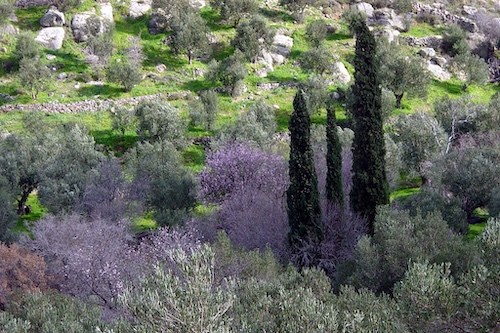Lesvos is rich in trees. Olive, chestnut, lemon, and pine trees are just a few of the many species that fill the lush forests and adorn the fertile fields and roads. The Lesvorians love their trees. Their harvests bring in money and they offer welcome shade in the summer. So, when a small army of woodcutters cut down about 25 cypresses and felled many laurel trees along one of the roads to Mandamados on August 18th, a big anger erupted. None of the residents of Mandamados have been informed about this disfigurement of their landscape.
On Lesvos, you will primarily find the Cupressus sempervirens, also known as the Mediterranean cypress. The slender version that rises like a minaret in the landscape, is called the Italian cypress and has become a contemporary symbol for a vacation in pizza land (as if Greek landscapes are not also characterized by these striking trees).
But the name definitely comes from Greece. Cyparissus was a handsome lover of Apollo, who received a beautiful deer as a gift from the god, which he loved dearly. One day whilst hunting he shot his arrow at an animal that was hidden partially in the shade; he accidentally killed his favorite deer. Oops, a little mistake. Cyparissus was inconsolable. He begged Apollo to kill him because he wanted to mourn forever. Instead Apollo turned him into a cypress tree, which is why this tree still symbolizes mourning and is often found near cemeteries.
In Iran, the cypress is the national tree and a symbol of eternal life, after Zoroaster, the founder of Zoroastrianism, brought one from paradise. It is said that the eldest cypress is also located in this country: about four thousand years old.
The order to cut down the cypresses in Mandamados came from the Forestry Service. It remains unclear who signed the order, but the fact remains that one of Lesvos’ iconic roads has been made a little less attractive. And just for traffic and fire safety.
What this forest management apparently hasn’t considered is all the new cypresses being planted in Spain: as more and more studies show that cypresses can be resistant to wild fires and slow them down. During a five-day forest fire in that country, a staggering number of trees, such as oaks, olives and pines were quickly reduced to ashes, but a large group of cypresses was miraculously spared from the flames, with a loss of only a few trees.
Cypress resin is not as inflammable as for example that of pine trees. Their densely packed branches with needles block the wind, and these needles retain a lot of moisture, also on the ground, which helps to slow down the spread of fire. These are properties that could help contain large wild fires.
In the photos accompanying the online newspaper article about the suffering in Mandamados, there were chopped cypress trunks visible, as well as felled laurel trees, that looked more like rhododendrons, shrubs that so cheerfully adorn the roads around Mandamados with their beautiful flowers. Information on the internet is becoming increasingly unreliable nowadays, but whether it were laurel or rhododendron, here too it seems that forest management hasn’t given it much thought, because these trees and shrubs, if well-maintained, are also fire-resistant greenery.
I wonder how a row of trees poses a danger to traffic, especially on a straight road where people consistently drive too fast. If trees suddenly pose a risk to drivers who can’t control their cars, I can think of a few other trees that are better candidates for removal. That could be a great clean-up event on the island. And then if you also consider that the trees are a fire hazard, then the island might as well get completely rid of all its trees.
A row of trees is, of course, not the same as an entire wood. The heart of Lesvos consists of a kind of primeval forest. At its core, many trees were forcibly removed to make way for the controversial Vastria refugee detention camp. According to the fire department, ‘a ticking fire bomb’ has now been created in the middle of that forest, thanks to the Greek government that has lavishly spent European money and is now determined to open the camp despite protests from human rights organizations, the islanders and the fire department. You’d better keep a very close look at the Forestry Service these days. Before you know it, you can suddenly see Vastria from the highway Kalloni – Mytilini: the felling of the trees at Mandamados might have been just a small exercise.











